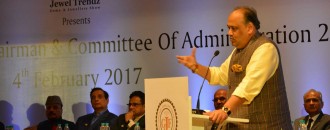
The various nuances of the anti-profiteering law under GST
By Ranjeet Mahtani & Stella Joseph As companies gear up for the final stages of implementing GST, a crucial exercise which is being carried out is a re-look at the existing contracts and negotiation with vendors from the perspective of alignment of contracts with the GST regulations. A crucial point of negotiation is for the vendor to pass on all benefits accruing or arising under GST to the recipient. In this context, the legislative backing comes in the form of Section 171 of the Central Goods and Services Tax Act, 2017 (“CGST Act”) which embodies the Anti-Profiteering provisions and the Anti-Profiteering Rules which have been finalised by the GST Council in its 17th meeting held on 18th June 2017. In terms of Section ...

India returned to fiscal consolidation in 2016-17: IMF
PTI Notwithstanding the impact of demonetisation, India returned to fiscal consolidation in the fiscal year 2016-17 largely due to the near-elimination of fuel subsidies and enhanced targeting of social benefits, the IMF said on Wednesday. "India returned to fiscal consolidation in fiscal year 2016/17, supported by the near-elimination of fuel subsidies and enhanced targeting of social benefits, notwithstanding the deceleration in growth related to the country's recent currency exchange initiative," the IMF said in its report on Fiscal Monitor released on the sidelines of the annual Spring Meeting of the International Monetary Fund and the World Bank. The IMF said, in India, the headline deficit is projected to decline modestly in fiscal year 2017/18, with continued delay in reaching the medium-term ...

Cabinet greenflags amendments for cess removal ahead of GST
PTI The Union Cabinet today approved amendments in the Customs and Excise Act relating to abolition of cesses and surcharges on various goods and services to facilitate implementation of GST. The amendments in the Customs Act, 1962, allow furnishing of information relating to import or export of goods by specified persons to enable analysis and detection of cases of under or over-valuation in imports and exports. It also aims to check misuse of export promotion schemes, including the Drawback Scheme, and violations of the provisions of the Customs Act and various other laws under which Customs officials have been authorised to implement these laws. "Amendments or repeal of various provisions of other Acts which will no longer be relevant consequent on rollout ...

GST Council approves all GST laws
By Ranjeet Mahtani and Sweta Rajan The 12th GST Council meeting on March 16, 2017, proved to be monumental with the Council approving the State GST and Union Territory GST laws. With this, all GST legislations viz. the Central GST, Integrated GST, State GST, Union Territory GST and the GST Compensation laws have been approved by the GST Council. After the Cabinet takes up these laws (except the State GST draft), the next step is the passage of the laws by the Parliament (Central GST law, Integrated GST law, Union Territory GST law and the GST Compensation law) and the respective States (State GST law) and Union Territories (viz. Delhi and Pondicherry). Prior to transition to GST – a game changer of a reform - the GST Council has two more crucial responsibilities, viz. approval of rules and regulations regarding: a) composition scheme, transition, input tax credit and valuation, ...

Gems & Jewellery sector seeks special GST rates
Sairaj Iyer G.V. Sreedhar, the outgoing chairman of the Gems & Jewellery Federation said 1.25%-1.3% is an ideal GST rate for gems and jewellery traders in the country. He averred that his federation would like the GST to be around 1.25%, although the industry demands differ ranging from 5%-18%. He pointed out, “We have been very clear from the beginning that VAT should be 1%, and excise tax should be 1%, put together it is 2%. But then 85-90% of our trade is out of excise and considering that revenue, the total value of GST should be 1.2-1.3%. We have given our representation to the government.” According to him, lower tax slabs will percolate into higher revenues, better compliance and organised in ...

Breakthrough by the GST Council and challenges ahead
Ranjeet Mahtani & Stella Joseph This week saw the GST Council make great strides in gathering consensus on unresolved issues. Three key decisions emerging from the meeting held on January 16, 2017 were as under: Consensus was achieved on the aspect of dual control between the Centre and the States. It was also agreed that States would have the power to tax activities carried out within 12 nautical miles. It was felt by the GST Council that July 1, 2017 seems to be the likely date when GST will be implemented in the country. As regards the aspect of dual control, it was decided that for assessees with an annual threshold of Rs. 1.5 crores or less, the States would have power to administer i.e. power ...

Beer industry to grow at 7.5% between 2017 and 2021
The Dollar Business Bureau India’s beer industry is slated to grow at an annual growth rate of 7.5% between 2017 and 2021, as rising disposable incomes of the middle-class segment will translate into higher spending, according to a recent report. Last year, India's beer consumption stood at 4.6 litres per capita as against 57 litres per capita of fast-emerging economies in Asia. Several states have imposed their own sets of regulations related to the sale of alcohol, in addition to licensing restrictions, excessive localised taxes and a countrywide restriction on advertising of alcoholic drinks, which has somewhat hit the industry’s growth. Despite that, this sector would continue to attract investments from both the domestic and the foreign beer makers, according to BMI Research’s "outlook ...

Traders using digital mode of payment will get a significant tax benefit: FM
The Dollar Business Bureau The Finance Minister when speaking to the press on Tuesday said, “the government's decision to tweak the presumptive income norms would reduce the tax liability by up to 30% for those small traders opting for digital transactions.” Stressing on the benefits to the small traders using digital mode of payment he said, “in the Budget for 2016-17, small traders and businessmen, with turnover of up to Rs.2 crore who did not maintain proper accounts, were presumed to have earned 8% income or profit for tax purposes. But if they use digital mode of payments, their income will now be presumed to be 6% of the turnover and not 8%.” "So he will get a significant tax benefit. The object ...


